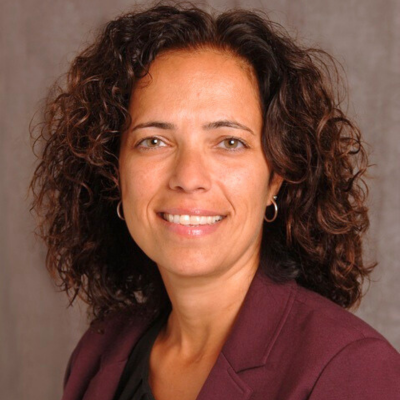Presidential Address
Saturday, November 16 | 6:15 PM – 7:30 PM
From Dr. Mary Cover Jones to Cardi B: Centennial and Contemporary Inspiration for Our Clinical Science, Education, and Connection with the Communities We Serve

Sandra S. Pimentel, Ph.D., Chief, Child and Adolescent Psychology, Montefiore Medical Center
Participants earn 1 continuing education credit
Categories: Treatment – CBT, Dissemination & Implementation, Health Care System
Keywords: Community-based, Child, Adolescents, Education and Training, Underserved Populations
All levels of familiarity with the material.
Sandra S. Pimentel, PhD, is Chief of Child and Adolescent Psychology, Associate Director of Psychology Training and Associate Professor of Clinical Psychology in the Department of Psychiatry and Behavioral Medicine at Montefiore Medical Center/Albert Einstein College of Medicine. She also launched and is the Director of the Anxiety and Mood Program (AMP), a specialty training program in the Child Outpatient Psychiatry Division and is the co-Director of the Becoming an Emerging Adult at Montefiore (BEAM) Program. Dr. Pimentel received the Psychology Internship Training Program Award for Excellence in Education and the Department of Psychiatry and Behavioral Sciences Award for Outstanding Mentorship. After serving in multiple leadership and governance roles, Dr. Pimentel is President of ABCT (2023-2024).
As a scientist-practitioner, Dr. Pimentel specializes in CBT for youth and young adults and is a committed clinician, educator, and mentor. She has delivered multiple workshops, trainings, and presentations for parents, mental health professionals, and community organizations and was named a New York State Office of Mental Health Policy Scholar. Dr. Pimentel is a health advocate dedicated to creatively engaging communities to optimize care for children and families.
Youth mental health is receiving increasing public and media attention as we observe exceptionally high levels of anxiety, depression, loneliness, and suicidality. It is staggering, and especially disturbing when we consider the sequelae among our most vulnerable and marginalized. Yet, through 100 years of the interplay of science and practice in CBT, there is cause for optimism in extending the benefits of these efficacious treatments for youth and families. Continual optimization by way of clinical science, rooted in our fundamental commitment to ongoing assessment and personalizing interventions, plus technological innovations that increase access and delivery, bring hope and results for our youth. In this presentation, the seemingly unlikely parallels of the lives and works of the “Mother of Behavior Therapy”, Mary Cover Jones, and Bronx New York’s pop icon Cardi B, will be presented as we examine the path from laboratory to community-based implementation of meaningful CBT programs and interventions.
In 1924, Dr. Jones published seminal research laying the foundation for behavior therapy followed by decades of work in child development. Initially “small n,” her work became large-scale and longitudinal. She asked incisive questions and warmly considered her subjects “partners in the studies of human lives.” As we commemorate her profound impact on our field, we celebrate her forward thinking and find relevant lessons that honor this history for our present-day clinical science, practice, and training—and the stories we are taught and those we choose to teach. In present day, we find Cardi B delivering authentic messaging about roots, community, empowerment, and mental health.
In voice and those of other relevant models across popular culture, we find many lessons relevant to our science, along with opportunities to inject creativity and fun for engaging and delivering CBT to young people. And, to more effectively disseminate evidence-based interventions to those most vulnerable and historically marginalized, being as flexible, genuine, and open to meeting youth in unique spaces may be the standard needed to make a real difference in their lives. This talk aims to showcase hope, humility, and unapologetic advocacy in our science and how we show up for and with the communities we serve.
Outline:
- Discuss youth mental health and review some areas of current CBT interventions and innovations
- Review and celebrate the history and ongoing impact the “Mother of Behavior Therapy,” Dr. Mary Cover Jones on our clinical science and community partnerships
- Discuss the impact and potential influence of the “Cardi B effect” and other pop culture models for how we deliver and teach our CBTs
- Discuss community-based implementation of meaningful CBT programs and interventions.
At the end of this session, the learner will be able to:
- Identify relevant lessons from the seminal works of Dr. Mary Cover Jones in clinical science and education
- Identify contemporary models in popular culture to optimize CBT delivery and engagement
- Discuss CBT interventions and innovations for youth mental health
- Identify opportunities for authentic community engagement to implement meaningful CBT programs and interventions
Recommended Readings:
Friedberg, R.D., & Rozmid, E.V. (2022). Creative CBT with Youth: Clinical Applications Using Humor, Play, Superheroes, and Improvisation, Springer.
Jones, M. C. (1975). A 1924 pioneer looks at behavior therapy. Journal of Behavior Therapy and Experimental Psychiatry, 6, 181–187.
Kendall, P. C., Gosch, E., Furr, J. M., & Sood, E. (2008). Flexibility within fidelity. Journal of the American Academy of Child and Adolescent Psychiatry, 47(9), 987-993.
Metzger, I. W., Turner, E. A., Jernigan-Noesi, M. M., Fisher, S., Nguyen, J. K., shodiya-zeumault, shola, & Griffith, B. (2023). Conceptualizing community mental health service utilization for BIPOC youth. Journal of Clinical Child & Adolescent Psychology, 52(3), 328–342.
Schare, M.L. (2024). A Centennial of Behavior Therapy: The Clinical Psychological Science of Mary Cover Jones, Ph.D., The Behavior Therapist, 47 (3), 157-173.

